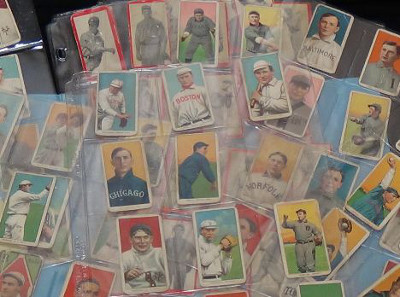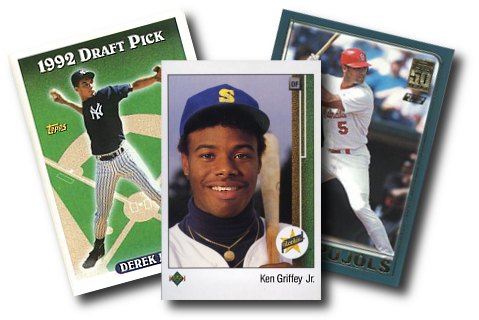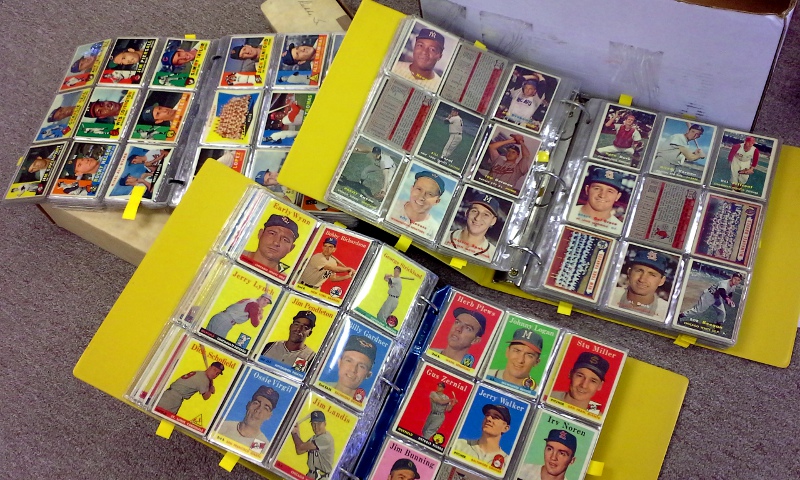"I will just hold on to the cards. They can only go up in value, right?"
 It seems unnatural to most people that baseball cards could ever lose their value, but the truth is that the value of vintage cards has not really appreciated since the early 1990's. I was a collector when sports cards gained popularity in the 1970's and 1980's. Many new collectors entered (or re-entered) the hobby. At that time, card prices increased multiple times.
It seems unnatural to most people that baseball cards could ever lose their value, but the truth is that the value of vintage cards has not really appreciated since the early 1990's. I was a collector when sports cards gained popularity in the 1970's and 1980's. Many new collectors entered (or re-entered) the hobby. At that time, card prices increased multiple times.The values of baseball cards peaked in the early 1990's and then decreased by 10% to 30% over the next few years. Since that time, the card values have been relatively flat. Many people find this last statement hard to believe, but it is very simple to verify. Simply go online and buy a Beckett's Price Guide from the early 1990's. (It costs less than $10 with shipping.) You then can compare the prices of the exact same cards with a current Beckett Guide.
Probably the most concerning trend in card collecting is the lack of new collectors entering the hobby. The boys of today are just not collecting sports cards (or playing baseball) like the past generations of kids did. This point can be verified at any of your local card shows. Twenty or thirty years ago, we used to see a bunch of kids at the shows with their fathers. This is no longer the case. Attendance of the shows is down, but more importantly you mostly see middle aged men.
Kids are spending their time and money on different things than the kids of earlier generations. The kids are now playing many more sports than just baseball. They also collect different items (such as fantasy game cards) and spending their recreation time on more interactive entertainment, like video games.

Starting in the 1990's, card makers started issuing hundreds of different sets yearly.
Kids began leaving the hobby in the 1990's when the manufactures started issuing hundreds of different sets each year. No one seems to know what to collect anymore. In my day, I would beg a quarter off my parents and buy packs of cards for a nickel each at the check out counter of the neighborhood Five & Dime. Today, most of the packs cost $5 or $10! Parents were much more willing to give their kids a quarter for five packs of cards, than to start pulling out twenty dollar bills. Yes, times have changed.
The market for vintage sports cards has always been fueled by collectors who first began buying cards as kids. As they got older and earned more money, they spent it on more expensive cards. If kids no longer collect baseball cards, then where is the next generation of vintage card collectors going to come from? No one is sure. This trend has many hobby professionals very concerned. It is hard to believe that a grown man will begin collecting baseball cards in his forties, if he did not collect them as a kid.
It goes back to our Economics Model of Supply and Demand. The supply of vintage cards is constant. Collections are sold when a collector passes away or needs money for a special event. Dean's Cards purchases over 500 collections each year. There is a steady supply of vintage cards.
The demand for the cards is the issue. Older collectors pass away every day. If new collectors do not continue to enter the hobby, there will be no fresh demand for the cards. If there is no demand, then the supply of cards will be greater than the demand. We all learned in our Freshmen Economics class that when that happens, the price of a particular item will decrease.
There are many hobby experts who feel strongly that this disturbing trend will continue and the price of cards will surely decline. I personally am much more optimistic, but even I do not see any growth (or price appreciation) happening in the hobby. 95% of our sales are to men between the ages of 35 and 65.

if you refuse to sell your sports card collection because you are sure that it is going to increase in value over time - this is not a safe bet.
I truly hope that the experts are mistaken about the future of the hobby and it continues to grow, but my guess is that card prices will remain flat in the best case scenario and probably decrease slowly over the coming years. The bottom line is that few hobby experts feel that the value of vintage sports cards will appreciate in the near future. Hopefully the tradition of the hobby will bring in enough new collectors to keep that price from declining too far. After all, this is my labor of love.
Please realize that few collectors share this opinion. After all, what collector who has spent thousands of dollars wants to think the value of the hobby he loves is decreasing in value?
The people that would have the most informed opinion are the old full-time dealers that make their living in the card collecting hobby. Many share my opinion, but few will express it publicly. There is no benefit to do so. None of us wants to damage our livelihood or even hurt the hobby that we love. Besides, we all sincerely hope we are mistaken and the hobby continues to thrive.
The point is this: if you refuse to sell your sports card collection because you are sure that it is going to increase in value over time - this is not a safe bet. That was exactly what they were saying about internet stocks just a few years ago and we all know how that played out...
by Dean Hanley-- Click to go back to the Main Sell your Baseball Cards Page --
or
We are only buying vintage cards from 1969 and older.*
* We can buy some 1970s cards when they are part of a large vintage collection.
* We do not buy cards newer than 1980. So sorry.


